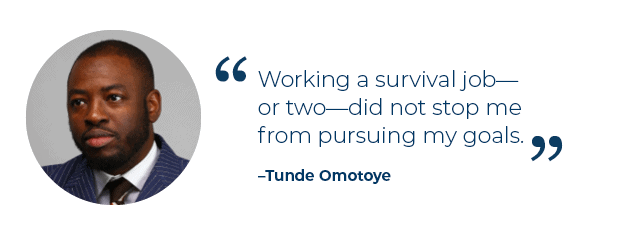Immigrant Success Story: Tunde’s Journey to Canada
Wednesday | December 11, 2019 | by Tunde Omotoye

Tunde Omotoye is a Senior Business Operations Analyst at BMO Financial Group.
He worked in Lagos, Nigeria, for nearly two years as a Human Resources Associate. He then travelled to Toronto to study human resources management, hoping to find a job after graduation and permanently settle in Canada.
In this blog post, Tunde explains how he went from being an international student to a successful professional in Canada.
Sitting at my desk in downtown Toronto, I often think about how I got where I am today. I recall my former job at a sausage factory, where I spent eight hours a day on my feet. Back then, I also had a night job as a traffic controller, outside in the cold, because I wanted to work my way through school.
That was the inauspicious beginning of my Canadian dream—not exactly what I had imagined a few months earlier, when I excitedly picked up my student visa in Lagos.
But it was part of a long journey that ultimately took me where I needed to be. Below, I will tell you my story, with the hope that you will find examples that guide your success in Canada.
First, I Pursued a College Degree in Canada
I decided to attend college in Canada in order to guarantee that I was making the strongest possible professional choices. My career in Nigeria was beginning to pick up, but I wanted to see what else was out there.
I remember being thrilled by the prospect of studying abroad, but I also felt uncertain. I had made my travel plans on short notice, so I was not financially prepared to pay tuition fees. But I had been accepted to one of Ontario’s best and fastest-growing colleges, and I was not going to turn down an opportunity to study in Canada.
Related Reading
I arrived in Toronto with only $2,000 CAD—enough to get settled, but insufficient to cover my school fees. After attending my first week of lectures in January, I realized it was too hard for me to focus on school because of the weather—which was extremely cold—and the sudden culture change. Everything was strange and new to me. I needed time to get acclimated.
In the second week, I went to the admissions office and requested that my enrollment be deferred for four months. I explained to the admissions officer that I was experiencing culture shock. It was necessary for me to understand the system and the people. I needed a life outside of school, without being under a lot of pressure. Additionally, I wanted the opportunity to save money to pay the remainder of my tuition fees.
Next, I Had to Find Work
That same week, I registered with an employment agency. Soon, a potential employer called me for an interview.
I thought that it would be easy to find a job, thanks to my human resources experience and bachelor’s degree from Nigeria. The reality, however, was different. I was told I would not find a job in my field without a diploma and professional designation from Canada.
Instead, I got the job at the sausage factory.
On my first day at the factory, I asked myself if I had made the right decision to move to Canada. In fact, my previous role in Nigeria was probably still available. However, despite my doubts, I believed that if I persevered I would overcome the challenges of settling in a new country.
Thankfully, I made friends at the factory who showed me around the city, giving me hope that I could learn more about Canada.
With the money I earned at my first job, I was able to cover a good portion of my school fees. I was also gradually adapting to my new culture.
Four months later, I resumed school and felt much more comfortable. That was when I took my second job as a traffic controller. On weekends, I cleaned robots at a Toyota manufacturing plant in Cambridge, Ontario. My earnings helped cover part of my second semester tuition fees.
My spirit was tired, but not broken. I had a goal, and that was where I kept my focus.
Then, It Was Time to Move Forward
Because of my good grades and my human resources experience back home, I got an internship at a large insurance company called the Co-operators. They offered an opportunity to work at their company headquarters in Guelph. This is how my professional career path in Canada truly got started.
In my day-to-day work, I made every effort to add value. My skills and competencies were fully utilized, and I soon started working toward a Certified Human Resources Professional (CHRP) designation. Although I had earned enough to nearly pay off my college fees in full, I kept my weekend cleaning job. I wore a shirt and tie on weekdays during my internship, and cleaned with a mop on weekends at Toyota.
By the end of my internship, I was able to pay off all my tuition fees. I passed the CHRP exam and became a certified HR professional in Canada.
By then, I had a postgraduate work permit that allowed me to work. Because I had shown excellent work ethic throughout my internship, I was offered a full-time position with the Co-operators.
Finally, I Obtained Permanent Residency
About a year after I began working full-time, I applied for (and received) permanent residency (PR) in Canada.
World Education Services (WES) has a great process for reviewing academic documents and providing an international credential assessment. After receiving my credential evaluation report from WES, I was able to state on my résumé that my Nigerian degree is equivalent to a Canadian bachelor’s degree. This gave me the confidence to start thinking about what my next steps should be in my career.
I always wanted to work in Toronto. Eventually the right opportunity came up: a higher role with more responsibility and a bigger portfolio. Today, I am employed at one of Canada’s “Big Five” banks as a Senior Business Operations Analyst working in Technology Operations.
Where I Am Today, and How I Give Back
Getting up in the morning and heading to my office job in Toronto, I sometimes think about the days at the sausage factory and the nights I worked as a traffic controller. I cannot help but smile.
I began to post on Twitter that I was available to help other immigrants and newcomers navigate their journey. Additionally, I do this work on a “pro bono” basis (which means I do not accept payment for my assistance).
Today, I help newcomers by:
- Reviewing their résumés
- Providing suggestions on how to prepare for interviews
- Advising them on career pathways
- Telling them about valuable resources to help navigate the Canadian labour market
I am happy that so many immigrants have shared their success stories with me, and I hope to continue helping as many as I can.
My Final Tips for Newcomers
Here is my advice for international students and professionals immigrating to Canada:
- Sort out your school fees first before immigrating.
- Arrive a month or two in advance to give yourself time to adjust.
- Do research on certifications and licences related to your field, since regulated professions might be different in your home country than they are in Canada.
- Take the initiative to meet people in your industry, so you can learn about job opportunities and developments in your field.
I know from personal experience that migrating to a new country is not always as easy as we think it will be. But I wish you all the best and I believe that you, too, can also succeed in Canada.
Related Reading
The views and opinions expressed in this article are those of the author(s) and do not necessarily reflect the official policy or position of World Education Services (WES).

